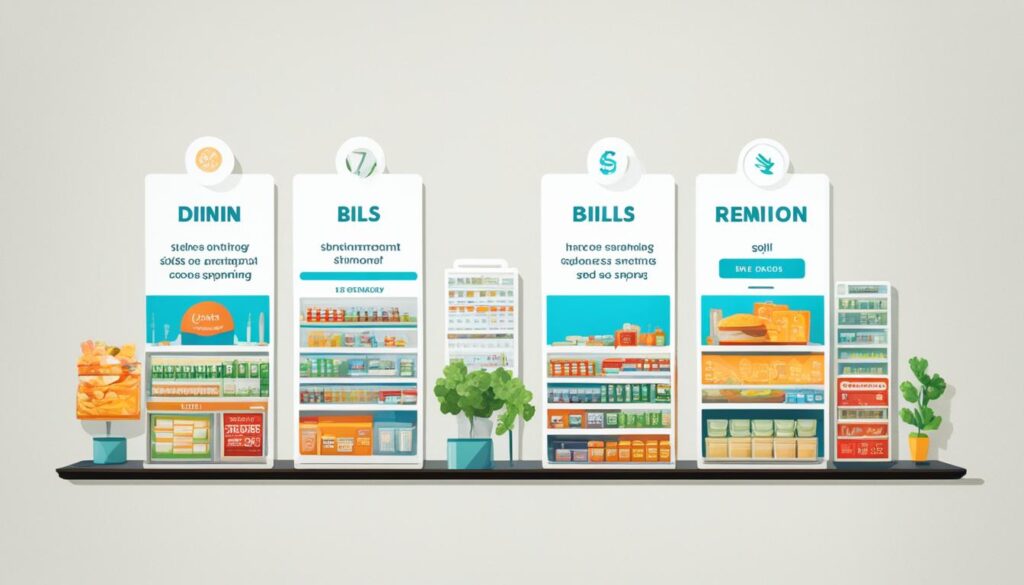Starting your financial journey can seem big at first. But, with simple budgeting tips, you can aim for more financial freedom. You don’t need big changes to save more money. Often, it’s the small, steady steps that make a big difference. So, take up these useful budgeting tips. Start to build habits that boost your savings and lower money stress. It’s about making the most of your money effortlessly.

Key Takeaways
- Discovering practical budgeting tips to elevate your financial well-being
- Effective strategies to save money and maximize your budgeting efforts
- The importance of disciplined spending and saving habits
- Simple adjustments that can transform your approach to money management
- Unlocking the potential of your earnings through smart budget planning
Understanding the Basics of Budgeting
Starting your journey to financial freedom begins with the basics of budgeting. A budget is like a map, showing where your money comes from and where it should go. It helps you navigate your finances with ease, moving you closer to your financial goals.
Defining a Budget and Its Purpose
A budget is simply a plan for your money over a certain period. It’s a financial snapshot, showing your income and expenses. By creating a budget, you align your spending with your financial goals. This ensures you live within your means and work towards future prosperity.
The Importance of Budgeting for Financial Freedom
Budgeting is key to achieving financial freedom. It helps you avoid debt, save for emergencies, and make smart financial choices. A good budget fosters discipline and finds areas to save money for growing your wealth and security.
A visual helps make budgeting easier to understand. The table below shows how budgeting can make a big difference in your financial life.
| Aspect | With Budgeting | Without Budgeting |
|---|---|---|
| Spending Control | Expenditure is proactive and planned. | Spending may be reactive and impulsive. |
| Savings | Regular savings are prioritized for future goals. | Minimal or no savings, limited future investment ability. |
| Debt Management | Strategic approach to reduce and manage debt. | Potential for increased debt and financial strain. |
| Emergency Funds | Earmarked funds for unexpected financial needs. | Lack of preparation for financial surprises. |
| Financial Goals | Clear objectives with a timeline and plan to achieve them. | Vague or undefined financial aspirations. |
In conclusion, mastering budgeting basics is crucial for financial freedom. By focusing on budgeting, you can confidently work towards a secure financial future. This brings peace of mind and the chance to enjoy your hard-earned money.
Initial Steps Towards a Frugal Lifestyle
Starting a frugal lifestyle needs you to know your finances well. It means choosing wisely and putting money management first. Such early steps help build a strong financial future and bring peace.

Identifying Essential vs. Non-Essential Spending
Living frugally means knowing what you must spend on versus what you can skip. Review your monthly spending to figure out necessities. Needs often are housing, food, healthcare, and getting around. Wants might include eating out, movies, and fancy items.
- Identify: Go through bank statements to see where your money goes.
- Categorize: Label each expense as ‘essential’ or ‘non-essential.’
- Evaluate: Reflect on non-essential purchases and consider their importance.
After sorting your spending, you can think about reducing or cutting out the extras. This way, you’ll save money without missing out on fun.
Creating a Plan for Your Money
Making a budget is key to better financial planning. Good financial planning covers both now and later.
| Income | Essential Expenses | Savings/Debt Repayment | Non-essential Expenses |
|---|---|---|---|
| Monthly Net Income | Rent, Utilities, Groceries | Emergency Fund, Credit Card Payments | Subscriptions, Dining Out |
| Other Sources | Insurance, Transportation | Retirement Fund, Student Loans | Hobbies, Vacation Fund |
To plan well financially, divide your income for different needs. This ensures essentials are covered, and future is secure. Making every dollar count is the aim.
Engaging in Proactive Finance Management
Adopting proactive finance management is a vital step for your financial future. Taking control of your finances helps you face economic ups and downs confidently. Let’s explore basic money management strategies for a stronger financial future.

“The best time to plant a tree was 20 years ago. The second best time is now.” – Chinese Proverb
This saying is true for managing money too. If you haven’t started yet, it’s time to begin. A good strategy is asking how financial decisions fit your long-term goals. This mindset keeps you focused on your financial health.
For proactive finance management, knowing your financial situation is key. Check your budget, investments, and savings regularly. Also, stay updated on economic trends affecting your finances. Here are ways and tools to be proactive with your money.
- Financial Audits: Periodic reviews of your finances to identify potential improvements.
- Expense Tracking: Using apps or ledgers to monitor spending habits.
- Investment Monitoring: Keeping track of investment performance and making informed adjustments.
| Proactive Action | Tools/Resources | Expected Outcome |
|---|---|---|
| Regular Budget Reviews | Budgeting software and spreadsheets | Alignment with financial goals and early detection of issues |
| Setting Up Emergency Funds | High-yield savings accounts, Money market accounts | Financial cushioning for unexpected expenses |
| Investment Rebalancing | Portfolio management services | Optimized asset allocation for risk management |
| Continuous Learning | Books, podcasts, webinars | Increased financial literacy and adaptability to economic changes |
Using these money management strategies will help control your finances. They enable you to make wise decisions, lessen financial stress, and enjoy a rewarding financial path. Remember, being proactive about finances is an ongoing effort for excellence.
Strategic Methods to Cut Down Expenses
To improve financial health, cutting expenses is key. Small changes in spending can make saving money easier. Here we discuss tips for living frugally that help reduce your monthly costs.

Frugal living tips aren’t about missing out. They’re about smarter spending for better financial health. Start with housing costs, a big part of your budget. Choose a smaller place or find a roommate to cut down on rent or mortgage. For transportation, try public transport or carpooling to save on gas and upkeep. With food, plan your meals and stick to a shopping list to avoid waste and extra spending.
Every dollar saved is a step closer to financial freedom. Embrace the journey of frugal living, and watch your savings grow.
Below is a table showing ways to reduce expenses:
| Expense Category | Current Cost | Proposed Savings | Frugal Tip |
|---|---|---|---|
| Housing | $1200/month | $300/month | Rent smaller unit or get a roommate |
| Transportation | $500/month | $150/month | Use public transportation or carpool |
| Food | $600/month | $200/month | Meal planning and grocery list adherence |
| Utilities | $200/month | $50/month | Implement energy-saving measures |
These steps show saving is possible with planning. Adopting cutting expenses strategies takes commitment and habit changes. Yet, the savings will make it worth it, aiming you towards your saving money on a budget goal.
Mastering the Art of Debt Management
Effective debt management is like an art with rules and strategies for financial health. Knowing your financial situation is the first step. Then, find the best ways to pay off debt. Before trying the debt snowball technique, knowing which debts to pay first is key.

Understanding Debt Repayment Priorities
Not all debts are equal. Some are more urgent because of high interest rates or if they’re linked to important assets. This list shows how to rank debts, helping you plan your repayments. Higher interest debts, like credit cards, or loans for your home should be your top priority.
| Debt Type | Interest Rate | Repayment Priority |
|---|---|---|
| Credit Card Debt | 15-25% | High |
| Mortgage | 3-5% | Medium |
| Student Loans | 4-7% | Medium |
| Personal Loans | Varies | Varies |
| Auto Loans | 3-7% | Medium |
| Medical Debt | Varies (Potentially 0% in some cases) | Low to Medium |
Implementing the Debt Snowball Technique
Using the debt snowball technique to repay debt can feel rewarding. It’s about paying smaller debts first, creating momentum. Start by paying the minimum on all debts. Then, put extra money towards the smallest debt.
As you pay off each debt, move the money to the next one. This creates a ‘snowball effect’.
- Make minimum payments on all your debts except the smallest.
- Pay as much as possible on your smallest debt until it’s completely paid off.
- Move to the next smallest debt, channeling all the funds from the previously paid debt into the new one.
- Repeat this process until all debts are cleared.
By using good debt management strategies, handling your finances becomes easier. Prioritizing debts and choosing the right payment method will lead you to financial success. This helps you not just manage, but master your financial future.
Adopting Money-Saving Habits
Developing money-saving habits can deeply improve your financial health. These habits lead to a life full of abundance and less stress. They’re about choosing wisely to meet your real goals. Adding minimalism to your life and using coupons and discounts can save a lot of money.

Embracing Minimalism
Minimalism means living with less and caring about what really matters. It values quality more than quantity. This lifestyle helps clear out unnecessary stuff in both your home and budget.
By choosing carefully what you need, you avoid buying on impulse. This saves money for your savings or investments.
Making the Most of Coupons and Discounts
Using coupons and discounts is smart for budgeting. Stores and brands offer deals to draw in buyers. These deals can lead to big savings.
Keep your coupons organized by when they expire. Make plans to shop when things are on sale. Also, digital coupons on apps simplify saving money.
- Subscribe to newsletters and alerts from favorite stores to receive timely offers.
- Combine coupons with store sales for compounded discounts.
- Check for cashback offers and loyalty programs.
- Invest time in researching the best deals before making any purchase.
In the end, embracing minimalism and being smart with coupons and discounts helps. It builds strong money-saving habits. This supports your financial goals and leads to a more purposeful life.
Planning Your Budget to Account for Fun
Making room for budgeting for fun is essential in budget planning. It helps with balancing expenses and supports mental health. This step is vital for enjoying your hard work while being smart with your spending.

Adding fun to your budget doesn’t have to be expensive. It’s about choosing an amount you’re comfy with after covering essentials. This amount can change based on the month, but it’s important to include it in your plan. Here are tips for fitting fun into your budget without hurting your financial goals:
- Check your income and balancing expenses to cover basic needs first.
- After saving and paying off debts, see what’s left for fun.
- Watch your extra spending to find ways to enjoy without going over budget.
Having a fun budget helps you avoid feeling burned out. Remember, great budget planning lets you live a happy life with what you have.
“Always budget for fun. Don’t lose sight of the present while planning for the future.”
Check out this simple example of how to divide your monthly budget, including fun:
| Month | Essential Expenses | Debt Repayment/Savings | Amount for Fun | Percentage for Fun |
|---|---|---|---|---|
| January | $2500 | $500 | $100 | 3% |
| February | $2300 | $700 | $150 | 4% |
| March | $2600 | $600 | $100 | 3% |
| April | $2400 | $500 | $200 | 5% |
By budgeting for fun, you fill your life with happiness and relaxation. A balanced budget, like a balanced life, needs careful planning, a bit of control, and room for enjoyment.
Budgeting Tips for Saving Money
Saving money is key for good financial health. To achieve this, knowing how to budget is essential. Using smart budgeting techniques can boost your savings. These tips also prepare you for a future where financial goals are within reach.
Automating Your Savings Plan
Setting up an automatic savings plan is a smart move. It hides your savings from you. Services from banks like Ally or Charles Schwab can help. They automatically move money from your paycheck into savings.
This stops you from spending that money. Automating savings helps grow your money with ease. You don’t have to think about putting money aside yourself.
Using Cash Envelopes to Control Spending
The cash envelope system works great for controlling spending. It involves putting set amounts of cash in envelopes, each for a different budget area. When an envelope is empty, you stop spending in that category.
Seeing the cash decrease helps you spend wisely. It keeps you from spending too much. This method makes you think more about where your money goes.